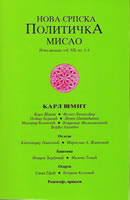| NSPM in English | |||
Post-Wall |
 |
 |
 |
| петак, 20. новембар 2009. | |
|
This reversal is usually explained in terms of the ‘immature’ expectations of the people, who simply didn’t have a realistic image of capitalism: they wanted to have their cake and eat it, they wanted capitalist-democratic freedom and material abundance without having to adapt to life in a ‘risk society’ – i.e. without losing the security and stability (more or less) guaranteed by the Communist regimes. When the sublime mist of the ‘velvet revolution’ had been dispelled by the new democratic-capitalist reality, people reacted in one of three ways: with nostalgia for the ‘good old days’ of Communism; by embracing right-wing nationalist populism; with belated anti-Communist paranoia. The first two reactions are easy to understand, and they often overlap (as in today’s Russia). The same rightists who, decades ago, were shouting ‘Better dead than red!’ are now often heard mumbling ‘Better red than eating hamburgers.’ The nostalgia for Communism shouldn’t be taken too seriously: far from expressing an actual wish to return to a grey Socialist reality, it is a form of mourning, of gently getting rid of the past. And nationalist populism, far from being peculiar to Eastern Europe, is a common feature of all countries caught in the vortex of globalisation. Much more interesting is the recent resurrection of anti-Communism, everywhere from Hungary to Slovenia. In October 2006, large protests against the ruling Socialist Party paralysed Hungary for weeks. Protesters blamed the country’s economic crisis on its leaders, the Communists’ successors. They denied the legitimacy of the government, although it came to power after democratic elections, and when police were used to restore a minimum level of civil order, comparisons were drawn with the Soviet army’s crushing of the 1956 uprising. In short, it was said that the Velvet Revolution of 1989 had to be repeated since, beneath the false appearance of democracy, nothing had really changed, the same dark forces were pulling the strings of power. In December 2006, Poland strengthened the ‘lustration’ law, which made it illegal for collaborators with the Communist secret police and others linked with the old regime to hold public office. Another aspect of the same process is the redefinition in the Baltic countries and in Slovakia of Nazi collaborators as ‘anti-Communist combatants’; their collaboration, even their participation in anti-semitic pogroms, is justified as a tough but necessary part of the patriotic struggle against Communism, as a lesser evil. In the Ukrainian Velvet Revolution that brought Viktor Yushchenko to power, the same songs were sung that used to be sung by Ukrainian nationalists who collaborated with the German occupation. No wonder that, at the instigation of some post-Communist countries, the European Parliament passed a resolution equating Communism with Nazism. And no wonder that, in Slovenia, the populist right reproaches the left for being a ‘force of continuity’ – with the old Communist regime. New problems and challenges are seen in terms of old struggles and the call for gay rights darkly interpreted as part of a Communist plot to demoralise the nation. How and why are these ghosts being raised in countries where many young people don’t even remember Communism? Anti-Communists ask a simple question – ‘If capitalism is really so much better than socialism, why are our lives still miserable?’ – and offer an equally straightforward answer: it is because we don’t yet have capitalism, we don’t yet have true democracy. Ex-Communists are still in power, disguised as owners and managers. We need another purge, the revolution must be repeated. One can’t help noticing the resemblance with the way the old Communist regime used to put the blame for its failures on the continuing influence of the ‘forces of the past’. This new generation of anti-Communists has an image of society that is uncannily similar to the traditional leftist image of capitalism: a society in which formal democracy is a mask concealing the rule of a wealthy minority. In other words, the anti-Communists don’t see that what they are denouncing as a perverted pseudo-capitalism simply is capitalism. Indeed, one could argue that, when the Communist regimes collapsed, the disillusioned former Communists were better suited to run the new capitalist economy than the populist dissidents. While the heroes of the anti-Communist protests continued to indulge their dreams of a new society based on justice, honesty and solidarity, the ex-Communists were able without difficulty to accommodate themselves to the new capitalist rules. Paradoxically, in the new post-Communist condition, the anti-Communists stood for the utopian dream of a true democracy, while the ex-Communists stood for the cruel new world of market efficiency, with all its corruption and dirty tricks. Is capitalist realism the only answer to socialist utopianism? Was what followed the fall of the Wall really the era of capitalist maturity, the leaving behind of all utopias? What if that era relied on a utopia of its own? November 1989 marked the beginning of the ‘happy 1990s’, Francis Fukuyama’s utopian ‘end of history’: liberal democracy, he announced, had effectively won, the advent of a global, liberal world community lurked just around the corner, and the remaining obstacles to this happy ending were merely contingent (pockets of resistance where the local leaders hadn’t yet grasped that their day was done). In contrast, 9/11 marked the symbolic end of the ‘happy 1990s’: it signalled the beginning of our current era, in which new walls are springing up everywhere, between Israel and the West Bank, around the European Union, on the US-Mexico border – but also within single states. It seems that Fukuyama’s 1990s utopia had to die twice: the collapse of the liberal-democratic political utopia on 9/11 did not affect the economic utopia of global market capitalism, but the 2008 financial meltdown surely has. In the 1990s, it was believed that humanity had finally found the formula for an optimal socio-economic order. The experience of the last few decades has clearly shown that the market is not a benign mechanism that works best when left alone. It requires violence to create the conditions necessary for it to function. The way market fundamentalists react to the turmoil that ensues when their ideas are implemented is typical of utopian ‘totalitarians’: they blame the failure on compromise – there is still too much state intervention – and demand an even more radical implementation of market doctrine. Today we observe the explosion of capitalism in China and ask when it will become a democracy. But what if it never does? What if its authoritarian capitalism isn’t merely a repetition of the process of capitalist accumulation which, in Europe, went on from the 16th to the 18th century, but a sign of what is to come? What if ‘the vicious combination of the Asian knout and the European stock market’ (Trotsky’s characterisation of tsarist Russia) proves economically more efficient than liberal capitalism? What if it shows that democracy, as we understand it, is no longer the condition and engine of economic development, but its obstacle? And if this is the case, maybe post-Communist disappointment should not be dismissed as a sign of ‘immature’ expectations. When people protested against Communist regimes in Eastern Europe, most of them weren’t asking for capitalism. They wanted solidarity and a rough kind of justice; they wanted the freedom to live their own lives outside state control, to come together and talk as they pleased; they wanted to be liberated from primitive ideological indoctrination and hypocrisy. In effect they aspired to something that could best be described as ‘socialism with a human face’. Perhaps this sentiment deserves a second chance. |
Остали чланци у рубрици
- Playing With Fire in Ukraine
- Kosovo as a res extra commercium and the alchemy of colonization
- The Balkans XX years after NATO aggression: the case of the Republic of Srpska – past, present and future
- Из архиве - Remarks Before the Foreign Affairs Committee of the European Parliament
- Dysfunction in the Balkans - Can the Post-Yugoslav Settlement Survive?
- Serbia’s latest would-be savior is a modernizer, a strongman - or both
- Why the Ukraine Crisis Is the West’s Fault
- The Ghosts of World War I Circle over Ukraine
- Nato's action plan in Ukraine is right out of Dr Strangelove
- Why Yanukovych Said No to Europe

.jpg)








 It is commonplace, 20 years after the fall of the Berlin Wall, to hear the events of that time described as miraculous, a dream come true, something one couldn’t have imagined even a couple of months beforehand. Free elections in Poland with Lech Walesa as president: who would have thought it possible? But an even greater miracle took place only a couple of years later: free democratic elections returned the ex-Communists to power, Walesa was marginalised and much less popular than General Jaruzelski himself.
It is commonplace, 20 years after the fall of the Berlin Wall, to hear the events of that time described as miraculous, a dream come true, something one couldn’t have imagined even a couple of months beforehand. Free elections in Poland with Lech Walesa as president: who would have thought it possible? But an even greater miracle took place only a couple of years later: free democratic elections returned the ex-Communists to power, Walesa was marginalised and much less popular than General Jaruzelski himself.













